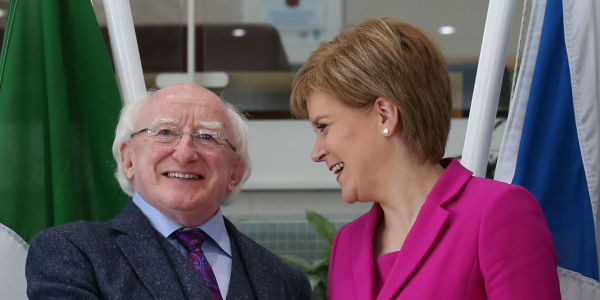Michael D Higgins has attacked the discourse of fear in the UK’s Brexit debate and said he is concerned about the future of the European Union (EU).
Mr Higgins said the UK’s Brexit debate was “rather sad” and that all member states must now be concerned about the future of the Union.
The President met Scottish First Minister Nicola Sturgeon in Glasgow to discuss ties between their two countries.
Ms Sturgeon has pledged to explore all options to keep Scotland in the EU, up to and including another vote for Scottish independence.
She said Ireland now has “issues” in relation to borders, with the largely pro-EU Northern Ireland facing the prospect of leaving and stressed that she does not want to see a border between Scotland and other parts of the UK.
Ms Sturgeon is also speaking to the Chief Minister of Gibraltar this week to forge pro-EU alliances with the UK areas that now face being “ripped out of the EU against our will”.
Speaking in Glasgow, Mr Higgins said: “I am concerned, very much, about the future of the EU itself and I think that it’s a matter that all of the members of the EU must be concerned about together.
“I don’t think that it is an issue for one or two member countries. I don’t think it is an issue for, as has been referred to, founder members of the EU.
“I am a believer in the EU and I think what we need to do is to rediscover its great moments.”
He said the Irish people have benefited for EU membership through freedom to work and study in other states.
Mr Higgins added: “What I think is rather sad, in relation to the recent consultations which is entirely a matter for the UK to arrive at its own opinion, was the degree of fear that was in the discourse.
“It seemed to crowd out, if you like, all the things that the people of Europe can achieve together that go far beyond the elimination of war.
“There are new responsibilities in relation to climate change, sustainable development, what we agreed in Paris, in New York, what the young people all over Europe are asking us to do.”
Although the issue was not specifically discussed with Mr Higgins, Ms Sturgeon told the Press Association that “there are clearly issues in Ireland about borders”.
“I don’t want to see a border between Scotland and other parts of the UK,” she said.
“But some of these issues, regardless of what happens in Scotland of course, do have to be addressed in the Irish context.
“These are difficult issues. They’re not issues of our making or our choosing.
“My job as First Minister is to try to navigate a path through this for Scotland that protects our place in Europe and protects the stability of our economy and our society, and that is what I’m very focused on doing.”
She added: “I hope to speak to the Chief Minister of Gibraltar in the next few days.
“I understand, of course, that Gibraltar equally voted to Remain by an even bigger margin than Scotland did.
“So while I can’t speak for what Gibraltar would want to do, I can certainly see considerable potential there for building common ground.
“For Gilbraltar, for Northern Ireland, for London and for Scotland – this idea that we can be ripped out of the EU against our will with all the damaging consequences that will flow from that is unacceptable, so I will be seeking to build as many alliances and forge as much common ground as possible.”
Mr Higgins addressed members of Glasgow’s Irish community at an event at the Govanhill neighbourhood centre.
He will receive an honorary degree of Doctor of Laws at a ceremony at the Usher Hall in Edinburgh on Tuesday, where he is also expected to take part in an a seminar on aspects of Irish history hosted by the university’s School of History, Classics and Archaeology.
Mr Higgins is also expected to address the Scottish Parliament on Wednesday.
At an event at Glasgow Royal Concert Hall, Mr Higgins hailed Scotland and Ireland’s “intertwined histories” and the cultural and language links that continue to bind the countries.
The president said: “Our relationship extends far into the mists of the past – so far that the realm of history merges into that of myth, legend and tradition. It has, in every period, involved collaboration and shared influence.
“These enduring cultural connections draw on the depth of that shared history, but they are perhaps more important today than they have ever been.
“There are new challenges, which we can meet in a very distinctive way, by drawing, for example, on our shared respect for dignity of work, the environment, human rights and the central infrastructure of culture.”
